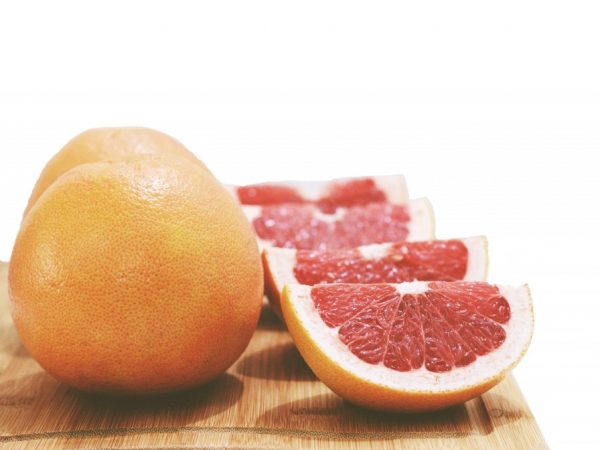Grapefruit during pregnancy
The vitamins present in citrus fruits are important for mom and baby. Grapefruit during pregnancy is beneficial when consumed in small amounts.

Grapefruit during pregnancy
The benefits of grapefruit
Citrus fruits contain a lot of useful substances, such as vitamins, trace elements, amino acid, fiber, essential oils and phytoncides. All these components are essential for health for mom and baby.
The benefits of grapefruit during pregnancy and breastfeeding are due to the following:
- Low calorie content. 100 g of pulp contains only 30–40 kcal. Calorie content depends on the variety.
- Least of all citrus allergens.
- The composition contains a substance that regulates blood cholesterol. Eating food regularly will improve blood circulation. During pregnancy, the benefits of citrus are too high, because lycopene normalizes blood pressure, the jumps in which are observed during the period of bearing a child;
- The low glycogen index maintains normal blood glucose levels, which makes it an indispensable product for people with diabetes.
- Vitamin A and beta-carotene contribute to the proper formation and development of the placenta and are responsible for the growth of the soft tissues of the fetus.
- Vitamin C boosts immunity and helps to strengthen the cardiovascular system.
- Pantothenic acid improves the functioning of the endocrine system, normalizes the activity of the adrenal glands and the nervous system of the mother.
- Grapefruit for pregnant and lactating women is a good prophylactic remedy for constipation. Fiber normalizes digestive processes, providing good intestinal motility.
- Folic acid ensures the full course of pregnancy and is involved in the formation of the baby's nervous system.
- Calcium provides the formation and strengthening of fetal bone tissue.
- Magnesium improves mental health, helps to get rid of depressive disorders and insomnia. It also prevents premature termination of pregnancy.
- Oils with grapefruit seed extract for pregnant women will be an effective remedy to fight stretch marks on the skin.
The harm of grapefruit
Despite the huge number of useful properties, grapefruit during early pregnancy can cause some negative consequences. It has been proven that if pregnant women consume too much grapefruit, this can provoke:
- deterioration of the liver;
- decrease in the effectiveness of drugs;
- stomach cramps;
- allergic reactions (in rare cases).
The harm of grapefruit to pregnant and lactating mothers will be only with frequent use in large quantities. There will be no harm from a couple of slices of juicy fruit.
Use during pregnancy

The fruit can relieve first trimester nausea
Citrus fruits during pregnancy will help relieve the expectant mother from a number of problems. Vitamins and trace elements in the composition are indispensable for bearing and proper formation of the fetus.At each term, grapefruit is especially useful for pregnant women.
In the 1st trimester:
- Helps to cope with nausea and reduce other manifestations of toxicosis.
- Strengthens the woman's immunity, which drops sharply in the early stages of pregnancy.
- Improves mood and reduces depression in the presence of hormonal imbalance.
- Helps to cope with vitamin deficiency.
In the 2nd trimester:
- Reduces puffiness on the legs and removes excess fluid from the body.
- Improves peristalsis and prevents problems with bowel movements, due to which pregnant women suffer from the development of hemorrhoids.
- Prevents the health of teeth and gums.
In the 3rd trimester:
- It will help normalize pressure surges.
- Prevent the rapid weight gain of the expectant mother;
- It will remove toxins and toxins from the body.
Eating grapefruit for pregnant women during the last trimester costs no more than half of the fruit per day.
Use with hepatitis B
Rules for the use of grapefruit while breastfeeding:
- Do not enter into the diet until the child reaches the age of 3 months. If the baby is prone to diathesis, use it only when the child reaches 6 months.
- Before eating, inspect the fruit for any damage or dents.
- Do not eat the white film from the slices.
- Do not eat the fruit on an empty stomach.
- After consumption for 2 days, observe the reaction of the crumbs.
- The daily portion should be about 100 g of pulp or a glass of juice.
- This fruit should be eaten no more than 1 time per week.
Too much fruit in the diet of a nursing woman affects the taste of breast milk, and the addition of bitterness provokes the baby's refusal to breastfeed.
Grapefruit in a child's diet

Children can be given grapefruit after a year.
Citrus should not be given to a child under 1 year old, but in some countries complementary foods are allowed from 6 months.
It is worth trying the fruit after being accustomed to pears, apples, peaches, plums, etc. This is due to frequent allergic reactions and digestive disorders in young children.
By the age of 12 months, the child's body will get stronger, and the stomach will be able to better tolerate fruit acids, essential oils and phytoncides contained in the composition.
When introduced into the diet, it is worth following the rules:
- You cannot offer the fruit for the first time if the baby is sick and several days after recovery. With a weakened body, it can cause a deterioration in the child's condition.
- The test is best done in the morning. There will be an opportunity to consider negative reactions and take action.
- It is advisable to start acquaintance with the fruit with juice.
- The first portion is 0.5 tsp. If there are no reactions, increase gradually by half. The maximum dose for a child in a single dose is 50 ml.
- Only after getting used to the taste, combine the fruit juice with other juices.
The composition of 100% grapefruit juices is too rich. It destroys tooth enamel, therefore it is not recommended for children in a concentrated form.
In the future, offer the child slices of fruit, having previously peeled and white veins. The fruit enhances the appetite.
Contraindications
There are no strict contraindications to the use of grapefruit during pregnancy, but it should be extremely careful. With a large number of positive characteristics, there are a number of side effects of a different nature. These include:
- rash on all parts of the body;
- redness and peeling of the skin of the face and hands;
- bloating in adults and colic in babies;
- constipation or diarrhea.
Contraindications for pregnant women include: gastrointestinal ulcers, chronic kidney and liver diseases, cystitis, hepatitis. In these cases, the fruit will only do harm. In some cases, grapefruit during pregnancy causes voice changes and the appearance of swelling of the lymph nodes.
Special precautions for use:
- Pregnant women should not eat raw or drink grapefruit juice together with medication.
- Do not abuse with increased acidity of gastric juice.
- When breastfeeding, it is better to abstain from fruits with red pulp until the child reaches six months of age.
- It is not advisable to use it for liver diseases.
After the first test by the child, observe for 3 days. If negative reactions occur, do not consume the fruit.
Conclusion
Citrus is indispensable in the diet of a future mother and a small child, but the first meals must be strictly controlled. With proper and moderate use, you will get not only a tasty treat, but also healthy food.


